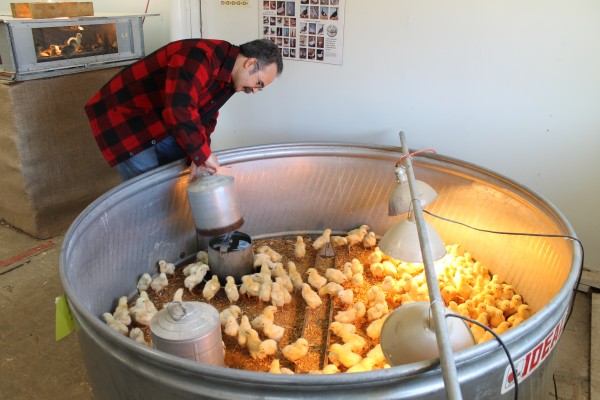Raising poultry in the Interior takes pluck
May 6, 2014
907-474-5042
5-6-2014
Steve Davila knows his birds so well that he can tell what their moods are by observing them. “The chirps they make when they are happy are distinguishable from when they are cold or hot,” he said. “They can tell you a lot if you pay close attention to them.”
Davila, manager of Alaska Feed Co., is knee deep in chirpers this time of year with all the chicks, ducklings and goslings in the store’s bird barn. And when he gets home at night he has his own flock to take care of.
Growing up on a poultry farm in Lakewood, Washington, Davila was accustomed to being around birds and helping out. In addition to standard birds, the family raised ornamental pheasants.
The Air Force brought Davila to Fairbanks in 1985. He has been with the feed store six years. He raises turkeys, guinea fowl and chickens for eggs and meat. “I had 40 ducks one year, but my wife said no more; they are too messy,” he said.
Davila and his wife Carol have three daughters. The one still at home raises steers, lambs and pigs for the market auction at the Tanana Valley State Fair. Davila leads the East Hills 4-H Club. “It’s a lot of fun and it gives the kids something to do,” he said. “They learn so much with their market projects without even realizing it.”
Another volunteer role for Davila is serving as superintendent of the fair’s market auction and on the fair’s board of directors.
Building adequate housing for year-round birds is one of the greatest challenges for Interior farmers, Davila said. Cost is another. “This is not an economy project,” he said. Considering the price of feed and fuel, people don’t raise chickens in Fairbanks to save money. “Unlike the Lower 48, we’re never going to get chicken production for economy,” he said. “It’s just never going to pencil out.”
The quality of the meat and eggs makes it worthwhile . “I know what my birds are eating, so I know what I’m eating,” Davila said.
He also simply enjoys being around the birds. “It’s a lot of fun. I didn’t realize it when I was young but doing this as a kid, it got into my blood.”
When beginners ask for advice, Davila tells them to be sure they have the dedication and interest to raise birds. “Make sure it fits in your budget,” he added.
He suggests that people raise meat birds such as the Cornish Cross first. “They’re ready to butcher in six weeks and in that short time you get a good idea what you’re in for all year long. People need to know if they’ll be able to do the butchering.”
Davila recently presented a well-attended talk called ‚ÄúChickens on the Cheep‚Äù for the –‘”˚…Á Cooperative Extension Service. He said people should get chicks from feed stores or hatcheries and advised caution on getting adult birds. ‚ÄúMake sure of their age, because production slows down as they get older.‚Äù
The hardiest breeds are the chickens that lay brown eggs. “I don’t know why that is,” Davila said. The most popular egg layer in Fairbanks is the Ameraucana. Davila also likes the Black Australorp, the Buff Orpington and the Jersey Giant. “They all have personalities,” he said. “Once in a while, there’ll be one that is not nice.”
At his place at Mile 3.7 Chena Hot Springs Road, Davila has winter and summer coops. The birds don’t leave their coop throughout the winter. Heat is provided by a 250-watt bulb, and Davila recommends using amber light at night so the birds will sleep.
Summer presents its own problems with predators looking for tasty snacks. “Ravens are bad about preying on small birds,” Davila said. Overhead netting is essential. “Last year, I had a great horned owl fly into my coop, and he couldn’t figure out how to get out.”
When the family is home, Davila lets the birds wander around the yard. “I like to watch them,” he said. Dogs and foxes are another threat. “It’s a sinking feeling watching a fox run off with your birds. It’s traumatic for kids to come home and find their birds dead.”
Besides fowl, Davila has a horse, Angus cattle and a lamb. The manure is used to fertilize the family garden. The best thing about all the critters is the joy his five grandchildren get from them, Davila said.
Note: –‘”˚…Á Cooperative Extension Service has a DVD, ‚ÄúThe Peep Show: Raising Laying Chickens from Chicks to Egg Producers.‚Äù It is available here for $5.
This column is provided as a service by the –‘”˚…Á School of Natural Resources and Extension and the Agricultural and Forestry Experiment Station. Nancy Tarnai is the school and station‚Äôs public information officer. She can be reached at ntarnai@alaska.edu.



